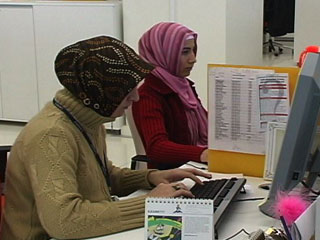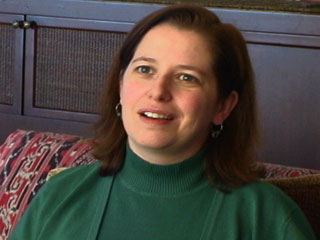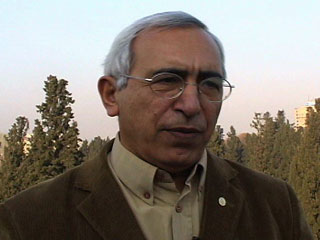Secular Islamic Turkey
KIRI OZTURK (reading to her children from a children’s book): Allah made camels with great big humps. Allah made elephants with long, slinky trunks.
KIM LAWTON: In a suburb of Istanbul, Kiri and Orhan Ozturk are teaching their kids about their Muslim faith. Kiri is American, and Orhan, Turkish. They met while Orhan was studying in the United States and were married in 1992. Kiri converted to Islam shortly after that. They moved to Turkey three years ago and say they’re happy to be raising their kids in a Muslim environment.
Ms. OZTURK: It’s so nice to be part of a community that you can share, and you don’t need to constantly be explaining why you’re doing things, especially during Ramadan when you’re fasting. It’s so nice to have everybody else be fasting at the same time.
ORHAN OZTURK: It’s a great feeling. Whenever you want to go, you go do your prayer, and you belong to a community. In the States you are basically segregated.
LAWTON: It may be a Muslim environment, but Turkey is officially secular, and there is intense public debate here about how to maintain that often tricky balance.
Ms. OZTURK: Trying to figure out what a non-Arab, practicing Muslim secular country should look like, how it should behave. And I don’t think everybody agrees yet on what that image is or how to put that together.
LAWTON: Partly in Europe, partly in Asia, Turkey has long been a bridge between East and West. But it doesn’t fit neatly in either.
ORAL CALISLAR ((Newspaper Columnist, CUMHURIYET): When you look from the Western side, Turkey is very Eastern country. When you look from the Eastern side, Turkey is very Western country.
LAWTON: The modern Turkish republic was founded in 1923 by Mustafa Kemal Ataturk, who imposed a strict secular nationalism in an effort to westernize the country.
JOHN ESPOSITO (Center for Muslim-Christian Understanding): Ataturk promoted aggressively a notion of secularism, which was a very absolute separation of religion and the state, although the state did control religion.
LAWTON: John Esposito directs the Center for Muslim-Christian Understanding at Georgetown University and has written widely about Islam in Turkey and the Middle East. He says all too often secularism translates to hostility.
Mr. ESPOSITO: If you look at secular elites in Turkey, their notion of secularism is not simply separation of church and state. They basically have a very negative attitude towards religion — towards religion itself.
LAWTON: Oral Calislar is a columnist at the leftist daily newspaper CUMHURIYET. He says the secularists don’t want to see Turkey become a theocracy like Iran, which imposes strict Islamic law.
Mr. CALISLAR: Iran example always threatens Turkey’s people’s mentality. They thought that some day, if we don’t be careful, Turkey will be Iran, and because of that the secular people are afraid from that, and because of that they are very careful about Islamic movement, political Islamic movements in Turkey.

“When you look from the Western side, Turkey is very Eastern country. When you look from the Eastern side, Turkey is very Western country.” |
LAWTON: A more openly Islamic view has been on the rise in this democratic state. The prime minister and current ruling party come from a religious political movement and often clash sharply with the secularists, and people like the Ozturks say those clashes filter down to average Turks, sometimes presenting challenges in living out their faith in their daily lives.
Mr. OZTURK: In a way, sometimes it’s easier in the States than here.
Ms. OZTURK: Yeah, I agree.
Mr. OZTURK: Although we are secular country and, you know, over 98-99 percent Muslim. But we go by the secularism very rigidly.
Ms. OZTURK: There’s sort of this message that’s going around that to be Muslim, to practice your religion is sort of backwards, old fashioned, and that to move forward is to be modern, to be more like the West.
LAWTON: One of the fiercest conflicts is over wearing the Islamic headscarf. Although it’s common to see women with the traditional religious head covering, Turkey has a longstanding ban on wearing headscarves in any public buildings, including government offices and universities.
Kiri chooses not the wear the scarf, but she sympathizes with those who do.
Ms. OZTURK: Women who choose to wear a headscarf cannot go to school, cannot get jobs, cannot enter many government buildings.
Mr. OZTURK: You can get jobs only in the private sector, not the…
Ms. OZTURK: …in the private sector, but even in the private sector…
Mr. OZTURK: …in the private sector, it’s harder…
Ms. OZTURK: …most of the private sector won’t hire women with scarves for fear that their corporation might be interpreted as being a religious corporation.

“Now Turkey is trying to redefine its identity, and this identity will never and shall never be a totally secular country.” |
LAWTON: Headscarves are accepted at ZAMAN, a daily newspaper that promotes Islamic values. Columnist Kerim Balci says the ban fuels resentment.
KERIM BALCI (Newspaper Columnist, ZAMAN): Now Turkey is trying to redefine its identity, and this identity will never and shall never be a totally secular country. Turkish secularism needs to accommodate religion also. I think people will be more peaceful when they are able to express their religious identities more and openly.
LAWTON: The Turkish government oversees Muslim religious activities through an office of religious affairs currently headed by Ali Bardakoglu, who met with Pope Benedict XVI last month. That office hires and pays the country’s imams and writes the weekly Friday sermon they are supposed to deliver.
Only three minority faith groups are officially recognized: Armenian Orthodox Christians, Greek Orthodox Christians, and Jews. All three technically have freedom of religion, but there are many restrictions. For example, they are not allowed to train new clergy.
Patriarch Mesrob II leads the Armenian Orthodox Church, Turkey’s largest religious minority.
PATRIARCH MESROB II (Armenian Apostolic Patriarchate): We are citizens of Turkey, and we do have certain issues that we would like to be solved, like having a seminary, teachers of language, teachers of religious knowledge, and these are some of the difficulties we face.
LAWTON: Roman Catholics and Protestants don’t have official legal status but are allowed to operate. Pope Benedict and the European Union have been pushing Turkey to grant more rights to its minorities. The EU has also raised concerns about the freedom of expression, especially Article 301, a vague law that makes it a crime to “insult Turkishness.” Among those prosecuted under the law was novelist Orhan Pamuk, who won this year’s Nobel Prize for Literature. The charges against him were dropped on a technicality.
LAWTON: Columnist Oral Calislar has spent a total of seven years in prison for things he has written. He says the situation is better today.
Mr. CALISLAR: Yes, I am criticizing always, today also. I don’t make any backwards step, yeah. I can write what I think, but it creates sometimes some problems.
LAWTON: Turkey has already made many reforms sought by the EU, and Calislar says there is growing resentment that the EU isn’t giving Turkey a fair shake.
Mr. CALISLAR: There are so many problems between EU and Turkey, and some of them are coming from Turkey, inside Turkey. But some of them are also coming outside. For example, some EU countries are not acting fairly to Turkey.
LAWTON: John Esposito believes it comes down to cultural and religious differences.
Mr. ESPOSITO: Within a 30 or 40-year period, Islam has gone from being relatively invisible in Europe and America to basically being the second or third largest religion. So (a) that’s an issue; (b) in many European countries, in addition to religion falling off, you have a growing anti-immigrant attitude.
LAWTON: Despite the issues of concern, Turks across the spectrum believe their system can be a model for other Islamic countries.
Mr. OZTURK: Turkey can be an example and I think it is an example, an example of a Muslim secular country that Western world wants to see, including U.S. and EU.
LAWTON: Turkey certainly isn’t the only country debating the role of religion in society. How this ancient crossroads between East and West ultimately resolves those debates will reverberate well beyond these borders.
I’m Kim Lawton in Istanbul.




